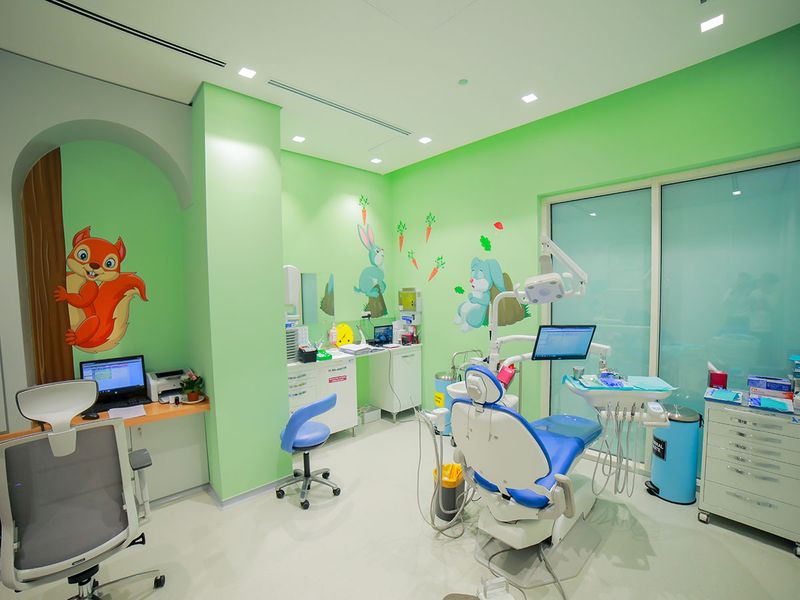

Highlight
The clinic designed by children brings together all outpatient paediatric services under one roof and is fully equipped to handle all types of conditions
With its colourful design and animal themes, the new Medcare Paediatric Specialty Centre can be easily mistaken for a children’s entertainment area. However, the facility’s design is not mere child’s play — it was designed “by children for children”.
We have facilities for outpatient care at the centre including short-stay rooms and isolation units in case of any emergency that needs special care.
– Dr S.M. Anees, Chief of Paediatrics, Medcare Paediatric Specialty Centre
“We conducted a competition for children to come and look at the space and tell us what exactly they want and it was designed based on the tips they gave us,” says Dr S.M. Anees, Chief of Paediatrics at Medcare Paediatric Specialty Centre. “There was a social media campaign when we launched the centre, which says it is kids approved.” After the centre was designed, the children were invited to see, inspect and give their stamp of approval. “It is very child-friendly and appealing to them,” says Dr Anees.
Launched in the New Year, the centre brings together all outpatient paediatric services under one roof and is fully equipped to handle all types of paediatric conditions, with a very experienced team of paediatricians.
“The senior pediatricians have been working in the UAE for the past 20-25 years,” says Dr Anees. “We have facilities for outpatient care at the centre including short-stay rooms and isolation units in case of any emergency that needs special care.
“There are vaccination services for children of all ages. We are also coming up with many subspecialty units for the clinic such as a paediatric dentist, paediatric neurologist, paediatric orthopaedic and a speech therapist.”

In another three months, the centre is set to have more subspecialties to take care of all the needs of children. “If a child needs any emergency care and needs to be taken to a hospital, we move them to the Medcare Woman and Child Hospital,” explains Dr Anees.
As far as investigations are concerned, the centre has all the facilities such as lab and radiology services for X-rays, CT scans and ultrasounds.
Common problems
As medical practitioners involved in paediatrics have the responsibility of taking care of children, what are the common problems that are usually tackled at the centre?
The common conditions, Dr Anees says, are upper respiratory infections that mostly affect schoolchildren from the ages two to eight years of age. “We also have children coming with diarrhoeal illnesses and some skin conditions,” adds Dr Anees. “Very rarely, we may come across conditions that need surgical help and we will refer them to the paediatric surgeon.”
When it comes to neurological conditions, the common ones these days are behavioural problems. Social media and the internet have played a huge role in creating awareness about developmental, behavioural and psychological issues. However, Dr Anees cautions parents against getting alarmed when they observe something unusual in their children. “Often parents read up a lot of information on the internet and will attribute an observation in their children to something serious,” he says. “When parents find their children not being able to concentrate on studies or work, they start getting worried. Even when the schoolteacher or nurse points to any behavioural issues, parents panic because nowadays everyone is aware about ADHD, behavioural disorders and autism.
“In addition, they will link it to all these disorders because they’ve googled and somehow the symptoms take them to these disorders. We get many anxious parents who have read a lot and don’t know what to rule out, which we as medical personnel can tell the difference.”
Warning signs
When children come for vaccinations, paediatricians look for any developmental delays that need the child to be referred to a neurologist. “If you are dealing with a small baby there are milestones that you need to look for,” explains Dr Anees. “We ask parents if their child has attained these milestones. If the child has not shown progress at a particular age, then we keep that child under observation and we will do what needs to be done. Every milestone has a range and we wait until that, if there are no risk factors. Very rarely we get conditions such as seizures or gross developmental delay.”
Are there any tests to know if the child has any neurological issues? There are no particular investigations to know if a child has autism or ADHD, says Dr Anees, but there are clinical scales or tests to ascertain the degree of a problem. “There will be a questionnaire to understand the history and then make a diagnosis. However, there might be some overlapping cases that require a blood test to be done but they’re not specific for ADHD or autism.”
All children deserve high-quality medical care. As a parent, it is important to be aware of the most up-to-date treatment guidelines so you can be sure your child is getting the best care possible.

“We would encourage parents to get information from whatever sources they can, but they may end up confused,” says Dr Anees. “It’s always better for them to consult their paediatrician.”
One of the most serious problems faced by paediatricians these days is addiction to digital screens. Parents often calm their children by playing a YouTube video and that is considered gravely detrimental to the child’s mental development.
“As a parent that’s the worst thing you can do to your child,” says Dr Anees. “It can really impact the brain as a child of less than three years old is not supposed to see a digital screen. He or she is not even supposed to be in the room where his parents are watching TV. Sometimes when parents are busy, the easiest thing to keep them occupied is to give them an iPad. The most annoying thing is gifting your one- or two-year-old child an iPad on his or her birthday.”
Addiction starts there, warns Dr Anees. “Any child who is used to getting engrossed in these things on screen is training his or her brain to get high stimulation. They get so used to that level that they’re not interested in any physical activity.”
Apart from addiction there are several other issues involved in such a practice. Children have problems with academics as their concentration levels get hampered, their eyes get strained, the skeletal system gets a beating as their backs and necks get affected, sleep disturbances occur, obesity is on the rise because they are not moving, also they aren’t playing with nature so their immunity is not challenged.
“As a result of bad posture, we often see changes in spines of children who are normally observed in people of an older age. A lot of children are coming with neck pain and sleep disturbances too. A child shouldn’t be exposed to digital screen five hours prior to sleep time.”
Birth defects
While a vast majority of babies born are healthy, one in 100 infants are born with a congenital or hereditary birth defect, how can you ensure long-term health?
With advanced scanning procedures, birth defects are mostly detected in the womb on an ultrasound during pregnancy, explains Dr Anees. “We will understand the extent of the problem and recommend treatment,” he says. “While some defects are treatable with medicines or surgery, it’s usually your family’s efforts to create a positive environment for your child that helps minimise the disability. I wouldn’t say all problems are curable, but most are manageable.”
Obesity issue
Paediatricians are also riddled with problems of obesity in children, which is alarming considering its implications on the general health of the child. “The numbers compared to 20 years ago are alarming,” says Dr Anees. “The reason is purely nutrition. Parents are not happy seeing a skinny child and often try to feed them more than they require. When children come for vaccination we also evaluate the weight and persuade parents to work on reducing if needed. It’s always seen that children who are fat in the first three years have a high risk of being obese later. There might be cases of underweight children too whose growth is stunted and need more nutrition and we advise parents accordingly.”